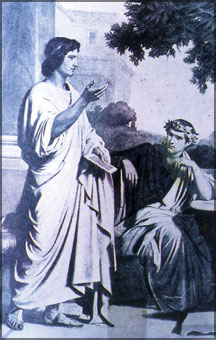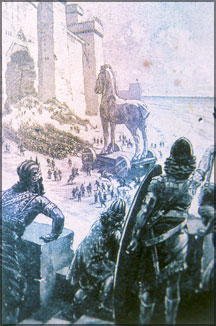|
The world of arts:
Virgil: he immortalised Roman poetry
Gwen Herat
When Virgil wrote his immortal epic, The Aeneid, little did he
imagine that it would not only immortalise his name but that of Rome's
poetry. The hero in this epic, Aeneas was no superman, neither did he
compare him to a super being because Virgil's faith in God superseded
any hero of a saga.
He believed Rome's place in the world to have been a part of the
divine plan of God. Aeneas was not merely the father of the nation but
servant of destiny and a part of it. With those high thoughts he created
exquisite passion for human pity. Hence, The Aeneid was born.
|

Rome’s greatest poets, Virgil and Horace at the palace of
the Roman statesman, Maecenas. |
A colourful, spectacular icon of ancient Roman literature, Virgil
sought to write in simple, beautiful language that Romans of his era
were used to reading. He was a trusted friend of Augustus Caesar and
along with another writer, Sallust, Virgil stood apart from them as a
genius. Caesar and Sallust contributed little to the literature of their
time but strangely, were very popular.
Virgil lived in Rome from 40 BC and was the son of a peasant and born
near Mantua. His mother was the daughter of the person who employed his
father and hence with her money, they were able to give Virgil a good
education.
He travelled across to Verona, Milan and Rome. He was hampered with a
curious slowing of his speech which made him shy and delicate in looks.
He withdrew from crowds and noise and was less ambitious than his
colleagues.
After a while, he returned to Mantua and wrote poetry. He always had
the nagging idea that nature resisted man and that glory of human life
lay in the opposing soul of nature. He argued with himself that God
wanted man to rise and awake the slumbering universe to greater life.
There were many such notions in Virgil's mind as he wrote.
While another colleague, Lucretius was a fatalist, Virgil was an
evolutionist. While Lucretius argued that man was helpless in the hands
of nature, Virgil insisted that man is nature's master.
|

The wooden horse outside the gates of Troy. |
In elevating Roman poetry, Virgil reduced the stature of Greek
literature. So majestic was the sweep of his poems, especially The
Aeneid, that it filled the country with new music and gave the Romans a
power of words as Greece never knew before. Rome was able to capture the
world with her power and new ideas and ideals that was to make Virgil
immortal after his death. Not that the Greeks lacked their quality but
lacked some one in the calibre of Virgil during the era.
However, the greatest names in literature belonged to the Greeks.
There was Homer and his poems; the philosophy of Plato and Aristotle and
the immortal tragedies of Aeschylus. So we have to accept that the
beginning of Roman literature are Greek. Rome was listless until Virgil
took over when Rome lacked opulence and refinement in literature.
Greeks gave their alphabet to the Romans when Phythogoras established
his monastery in Italy. Rome at that time was conscious of intellectual
shortcomings and one would imagine how the shabby little Rome was able
to produce an intellect like Virgil and others of high calibre such as
Ovid, Horace, Cato, Terence, Livy, Cicero, Tacitus, Pliny etc. Literary
figures such as them born before and after Virgil, still trail behind
Virgil in popularity as he stand above the rest. He made universal
language in Roman literature.
How did he do it? As much as he elevated poetry, he elevated mankind.
He used beautiful language with a strange power of man to convey his
words describing what eventually became his genius and for a shy
solitary man raising Roman poetry to the level of the Greek, endeared
him to all the generations of mankind. Even today when the name of
Virgil is mentioned, there is an aura of reverence experienced.
Tales of the Romans and their poetry have much more romance though
they lacked in substance. They had nothing called grammar and horrible
writing until the Greeks gave them the alphabet.
Little is known about their dictions but as the Latin race, the
Romans were rich in their apatite for song and dance which they
celebrated at festivals for their mythological gods. They did have some
literary compositions.
Came the BC era when writers and poets took upon themselves to enrich
this talented nation to what it is today not only in literature but the
arts. Today, Italy boasts of its rich cultural heritage that resulted in
giving the world the best of writers, painters, singers, dancers,
sculptors, craftsmen and above, the religion of the Roman Catholics.
(to be continued)
|

